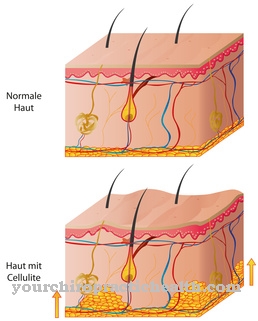The Milk protein allergy or Cow's milk allergy mainly affects infants and children. The milk protein allergy often heals spontaneously, but requires special diets. It must also be distinguished from lactose intolerance.
What is a milk protein allergy?

© absolutimages - stock.adobe.com
The Milk protein allergy is also called cow's milk or Milk allergy designated. The milk protein allergy occurs primarily in babies and children, but in many cases disappears again when they start school. Among the milk allergies, the milk protein allergy is the most common variant in babies and children.
In adults, milk protein allergy is a comparatively rare form of milk allergy. The milk protein allergy consists of various proteins that are contained in cow's milk. These proteins include, for example, casein or so-called immunoglobulins. Often, a milk protein allergy is also directed against milk from animals such as goats or sheep.
Symptoms that can be triggered by a milk protein allergy include skin rashes or impairment of the gastrointestinal tract (which can be expressed, for example, in nausea or flatulence). In rare cases, symptoms of the respiratory tract or the circulatory system occur as a result of a milk protein allergy.
causes
Different causes leading to one Milk protein allergy are not yet fully understood in science. However, it is a certain fact that babies can develop a milk protein allergy due to early exposure to milk proteins.
The background to this is that the immune system of babies is still incompletely developed to protect the body from potentially allergy-causing substances such as milk proteins. This then leads to a milk protein allergy. As a rule, babies are more at risk of developing a milk protein allergy the younger they are.
Another causal factor for the development of a milk protein allergy is assumed to be a hereditary factor; Children of people who have a milk protein allergy probably have a higher risk of suffering from a milk protein allergy themselves.
Symptoms, ailments & signs
Since the symptoms of a milk protein allergy are unspecific, they can often only be determined with certainty very late. They can vary in severity and occur either immediately after consuming milk or a few hours later. Sometimes just a few drops are enough to trigger an allergic reaction.
The allergy to milk protein differs only slightly from an intolerance. Therefore, these two diseases are often confused. However, the intolerance is much less pronounced. A milk protein allergy often manifests itself through digestion. Symptoms such as flatulence, constipation or stomach pain can occur.
The skin also shows allergic reactions. Sick people often suffer from itching, severe rashes, eczema or swelling of the face. Vomiting or bloody stools may also occur after consuming large amounts of milk. The disease also affects the psyche: those affected describe symptoms of fatigue, mood swings and even depression.
In rare cases, anaphylactic shock, i.e. a circulatory collapse, can occur. A food diary can be used to determine whether the symptoms indicate a milk protein allergy. If the symptoms always occur after consuming milk or dairy products, an allergy can almost certainly be assumed. It should be noted that the reactions to processed milk are often lower.
Diagnosis & course
Especially with small children one takes Milk protein allergy often a favorable course if milk proteins are omitted in their diet. A favorable course here is understood as the fact that the milk protein allergy regresses by itself.
From a statistical point of view, such a favorable course of milk protein allergy can be assumed in around 80 percent of the children affected. In rare cases, the milk protein allergy persists into adulthood. Children who suffer from a milk protein allergy are at an increased risk of developing further allergies.
To diagnose a milk protein allergy, blood tests and so-called prick tests or subcutaneous tests may be suitable (depending on the proteins against which the allergy is directed). In prick and subcutaneous tests, the skin of a potentially affected person is brought into contact with possible allergens. Corresponding skin reactions can ultimately speak for a milk protein allergy.
Complications
If the allergen is consistently avoided, cow's milk or milk protein allergy usually proceeds without complications, provided it is correctly diagnosed. Even newborns can have an allergic reaction to milk protein. Complications such as asthma or hives can only arise if the milk protein allergy remains undetected and untreated for a long time.
Since the symptoms of milk protein allergy are relatively unspecific, the constant intake of cow's milk products can cause long-term effects in the intestinal system. The overreaction of the immune system caused by milk protein may have been genetically influenced. However, the researchers are also focusing on other polluters.
Casein allergy sufferers should avoid all dairy products in order to prevent complications later. People who are allergic to whey protein often tolerate mare's, sheep's or goat's milk, as well as soy and rice milk. Many sufferers have a milk protein allergy, which includes allergic reactions to casein and whey protein.
The worst conceivable complication of a milk protein allergy is anaphylactic shock after consuming cow's milk. Sometimes even a small amount of a dairy product is enough to cause an allergic reaction. Further complications in the case of a more favorable course, but the impossibility of giving up cow's milk, can result from the antihistamines administered or a drug containing cortisone.
These preparations show side effects after long-term use, especially cortisone. Therefore, to avoid complications and consequential damage, the consistent avoidance of allergens is the top priority.
When should you go to the doctor?
As a rule, a milk protein allergy should be examined and treated by a doctor, as it does not usually go away on its own. Visiting a doctor is always recommended and can significantly relieve symptoms. In acute emergencies, the emergency doctor can be called or the hospital can be visited. If the milk protein allergy has not yet been recognized, a doctor can be consulted if the person concerned suffers from pain in the abdomen or stomach.
This pain can indicate a milk protein allergy, especially after consuming dairy products, and should be examined. Furthermore, depression or mood swings indicate a milk protein allergy. If this allergy is severe, it can even lead to shock, which should be treated by an emergency doctor. The first diagnosis can be made by the family doctor. Further treatment is often provided with the help of medication and an appropriate diet so that symptoms can be limited.
Treatment & Therapy
Therapy can do the Milk protein allergy does not cure, merely alleviate or remedy the symptoms associated with it. Corresponding therapeutic measures in the case of a milk protein allergy are primarily a targeted avoidance of the ingestion of certain proteins by the person concerned.
For this purpose, it makes sense to have a diet plan drawn up in consultation with the attending physician, which takes into account the individual structure of a milk protein allergy and excludes allergy-causing proteins. However, since proteins and the calcium contained in milk are important for the body, a diet plan for a milk protein allergy should include alternative foods that can meet the needs.
In addition, it is often necessary to supplement a diet plan with vitamin-containing nutrients in a milk protein allergy. In children and infants in particular, adequate nutrition can be achieved in the case of milk protein allergies, for example by giving them special substitute food or by giving them appropriate food supplements.
Outlook & forecast
A milk protein allergy cannot be treated and accordingly there is no prospect of a cure. Adults who suffer from it have to come to terms with it. However, in some cases of milk protein allergy there is also no serious impairment. From a medical point of view, there are no restrictions at all if the allergen is consistently avoided.
In the worst case, anaphylactic shock occurs due to the allergy. The prognosis here depends on how quickly emergency care will be provided. In the hospital, the patient then has to be stabilized, whereby the quality of the has a great influence on the prospect of complete recovery.
In the case of children, it is also the case that 90 percent of toddlers allergic to milk protein have developed tolerance by school age. With them, the allergy disappears on its own, which can be explained by a fully developed digestive system. In addition, milk protein allergies are of different nature: It is also possible to be allergic to species-specific milk proteins from goats, mares or sheep. Accordingly, there are also those who are allergic to milk protein who do not find out about their allergy for the rest of their lives.
In most cases in which the allergen is accidentally ingested, the consequences are also comparatively harmless. The intestinal complaints usually pass after a few hours and permanent damage is not to be expected.
prevention
As a great way of getting one Milk protein allergy To prevent this, experts consider, for example, feeding an infant with breast milk. Breastfeeding strengthens an infant's immune system. If it is not possible to exclusively feed an infant through breastfeeding, in order to prevent a milk protein allergy, it is advisable to refrain from giving cow's milk or products containing cow's milk. The latter applies in particular to infants who have an increased risk of a milk protein allergy.
Aftercare
Since milk protein allergies are treated relatively well, so that there are no particular restrictions or other complaints in the life of the person affected, there is no classic follow-up care. As with any allergy, if left untreated, it can lead to various complications and complaints, so that the person affected should contact a doctor at the first symptoms and signs of this disease.
Possible interactions should be discussed with a doctor. In most cases, the life expectancy of the patient is not negatively affected by an allergy. However, if there is a shock or a severe attack, you can go to the hospital directly or call the emergency doctor. Affected people may have to change their habits or diet in order to avoid the substances triggering the allergy. This is the only way to avoid further complications.
You can do that yourself
The majority of patients suffering from a milk protein allergy are children. Troubled parents should be patient here.Around 90 percent of those affected develop a tolerance to milk protein, often before they reach the age of six.
Patients who are not allergic to casein but only to whey proteins usually tolerate ultra-high temperature milk products, as whey proteins are destroyed by high temperatures. Very often this group can consume horse, sheep or goat milk products without any problems. Those affected should therefore definitely clarify which proteins in cow's milk they are actually allergic to. An allergy test for soy, lupins, rice and almonds is also recommended.
A wide range of plant-based substitute products is now available to those who tolerate these foods well. The increasing popularity of vegan foods has meant that "plant milk" is now even available in discount stores. Since plant-based milk alternatives differ much more than cow's milk in terms of taste and consistency, different varieties should be tried until you find a product that tastes good. In addition to milk alternatives, there are also cream, yoghurt and cheese on a plant basis. If you are inexperienced here yourself, it is best to ask a vegetarian or vegan you know about the shops with the best range of substitute products in the respective city.

.jpg)

.jpg)
.jpg)



















.jpg)



